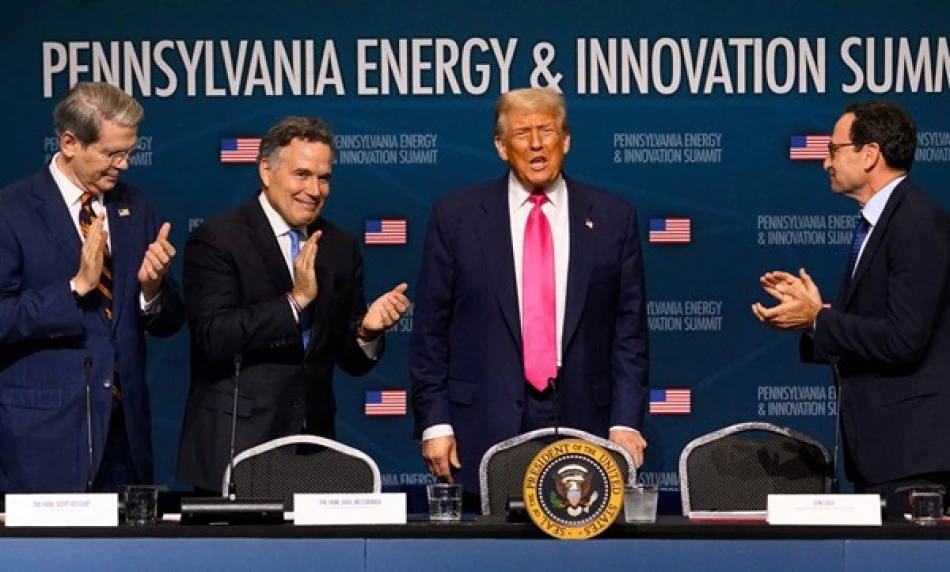
Trump Announces Major AI Investments to Boost U.S. Artificial Intelligence Capabilities
Trump Unveils $92 Billion AI Infrastructure Blitz as America Races China for Tech Dominance
President Donald Trump announced a massive $92 billion private sector investment package targeting energy and infrastructure development to power America's artificial intelligence boom, signaling an aggressive push to maintain technological supremacy over China. The initiative, unveiled at Carnegie Mellon University, represents one of the largest coordinated AI infrastructure commitments in U.S. history, with tech giants and energy companies joining forces to address critical power shortages threatening America's AI leadership.
The Scale of America's AI Power Crisis
The investment breakdown reveals the magnitude of America's infrastructure challenge: $36 billion earmarked for data centers and $56 billion for power generation facilities. This massive capital deployment underscores a harsh reality—the current U.S. electrical grid simply cannot support the exponential growth in AI computing demands.
Industry officials project that American tech companies will require up to 5 gigawatts of power for AI operations by 2028—enough electricity to supply approximately 5 million households. This staggering demand stems primarily from energy-hungry processing units manufactured by California-based Nvidia, now the world's most valuable company by market capitalization.
Google Leads Corporate Commitment Wave
Google emerged as the flagship investor, pledging $25 billion for data centers and AI infrastructure across northeastern states, plus an additional $3 billion to upgrade two hydroelectric power plants in Pennsylvania. Ruth Porat, Alphabet's president and chief investment officer, explicitly endorsed Trump's directive for accelerated AI investment to maintain American leadership.
Private equity giant Blackstone matched Google's commitment with its own $25 billion pledge for data centers and infrastructure, while other major players including BlackRock, Palantir, Anthropic, Exxon, and Chevron participated in the summit.
Strategic Implications for Global Tech Competition
Trump's emphasis on outpacing China reflects growing concerns about losing technological superiority in the AI race. His declaration that "America's destiny is to dominate every industry and lead in every technology" positions this infrastructure push as essential to national security and economic competitiveness.
The timing is critical. While the U.S. currently leads in AI development, China has been rapidly expanding its own AI capabilities and infrastructure. This $92 billion commitment represents America's most concrete response to that challenge, moving beyond rhetoric to massive capital deployment.
Market and Investor Perspective
For investors, this initiative signals several key trends. Energy companies stand to benefit significantly from the power generation investments, while data center operators and construction firms face unprecedented demand. The commitment also validates the long-term growth trajectory of AI-focused stocks, particularly those in the infrastructure and semiconductor sectors.
The geographic concentration in Pennsylvania and the Northeast suggests these regions will emerge as major AI hubs, potentially driving real estate values and creating new employment centers around data facilities and power plants.
Workforce Development and Economic Impact
Beyond hardware investments, the initiative includes substantial commitments to AI training programs and apprenticeships. Pennsylvania Senator David McCormick characterized the investments as having "massive implications for Pennsylvania" while being "vital for the country's future."
This workforce component addresses a critical bottleneck in AI development—the shortage of skilled technicians and engineers needed to operate and maintain sophisticated AI infrastructure. The training programs could position American workers to capture high-paying jobs in the expanding AI economy.
Challenges and Risks Ahead
Despite the ambitious scope, significant hurdles remain. Regulatory approval for new power plants typically takes years, potentially delaying the timeline for meeting 2028 energy demands. Environmental concerns about increased power consumption, particularly if fossil fuel plants are involved, could generate political opposition.
Additionally, the success of this initiative depends heavily on continued private sector commitment and technological advances that could reduce AI's energy requirements. Any economic downturn or shift in AI investment priorities could undermine the long-term viability of these infrastructure projects.
The $92 billion commitment represents more than just infrastructure spending—it's America's declaration that it will not cede AI leadership to international competitors, regardless of the cost.
Most Viewed News

 Layla Al Mansoori
Layla Al Mansoori






